In the midst of serious living difficulties and an unemployment crisis among the young in their 20s and 30s, establishing a business of one’s own is emerging as an important alternative for young people. However, most young entrepreneurs start up a business with little capital in the harsh business environment, where large enterprises and franchise businesses are all over. Some of them may succeed after countless trials and errors but many have to face the reality and drop to their knees before the monopolistic market.
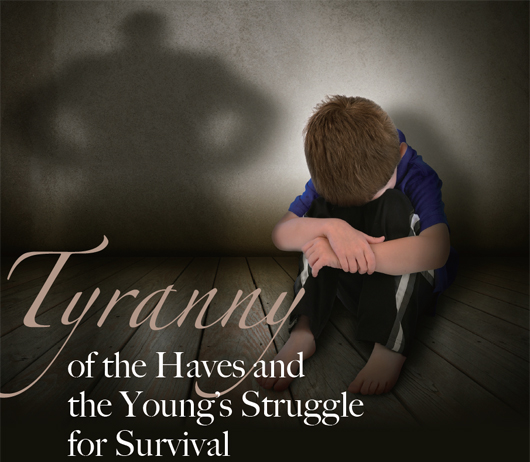
Lim Chae-woon, a professor at Sogang University (Dept. of Business Administration), said, “Business failure rates among individual businessmen in Korea reach 80 percent. There are no official statistics on the business failure rates among young individual entrepreneurs, but it is assumed that it would be much more than 80 percent. According to ‘Analysis on the present condition of establishment and removal of enterprises in Korea 2004-2009’ by Statistics Korea, about 600,000 enterprises are newly established and 580,000 enterprises disappeared annually. To simply compare the two numerical values, it can be then said that newly established businesses go bankrupt immediately.”
Such failures of business start-ups by young entrepreneurs are often regarded as merely the result of a lack of abilities in the young. However, recently, established organizations from small and medium-sized franchises to large enterprises are stealing young businessmen’s ideas and techniques which are the bases of their businesses and threatening them in the business field. The problem is that there is no adequate rule or law to prevent market monopolization by chain and large enterprises and to protect the enterprises of young businessmen. At this point, it almost seems there is no point in blaming only the large enterprises for killing the businesses of the young, when the problem is rather on the government which turns a blind eye to this tyranny of the haves.
Tears of Strawberry Mochi
On July 28, one young entrepreneur’s story, titled ‘Tears of Strawberry Mochi’ was spread abroad through the TV program ‘Sisa Magazine 2580.’ According to the program, Kim Min-soo went to Osaka, Japan 4 years ago and there he had the chance to eat strawberry mochi, which gave him an idea to set up his own business. He learned the recipe for the mochi and began doing business in partnership with Ahn Hong-sung, who had been selling strawberry mochi in Myeongdong. The business was a huge success. Kim’s strawberry mochi soon became very popular as it was broadcast on several TV shows. However, only 10 days after the business began to prosper, partner Ahn suddenly claimed cancellation of their contract. As Ahn did not even return the investment, Kim posted his story on the internet and began staging a one-man demonstration. Kim argues that he is a victim of ‘the tyranny of the haves.’ According to him, Ahn had been planning to do chain business with Daewoong Holdings Co., Ltd when Ahn cancelled the contract with him and Kim was continuously threatened to renounce his business rights.
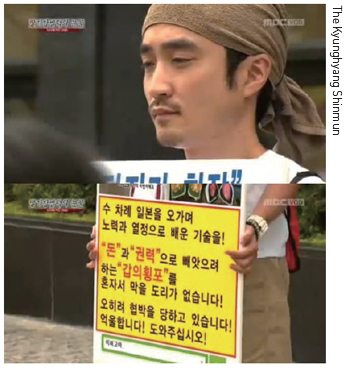
Daewoong Holdings also maintained that it only concluded a consulting contract regarding the business but never planned a merger or acquisition at all. Regardless of the subject to blame, however, this controversy which was aroused just about two months ago, shows well how much young people’s newly set-up businesses are susceptible to being affected by major enterprises and chain businesses under no protection by any laws. If Kim’s argument is true, Kim had his business item stolen and thus cannot continue his business any longer. There is no other choice but Kim has to abandon his business and start a new one, and to do so he will have to put the same amount of investment, time and effort, if not more, as he did with his previous business but he is not given any compensation.
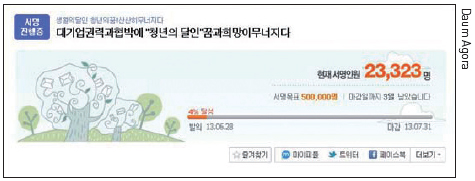
Chef’s Bob Burger is also strongly refuting Oh’s statement saying, “We are not a big capitalist. We opened the first Chef’s Bob Burger just last Thursday. There are many other enterprises selling Bob Burgers and we just tried to follow the trend.” However, Oh also rebuts that Chef’s menu is almost the same as BonGousse’s and there is evidence that they used a mold on which the name ‘BonGousse’ is stamped.
Recently, as there were an increased number of cases in which a franchiser exploited or oppressed its’ franchisees, the law to protect business rights of franchisees has been strengthened. Nonetheless, a case where the opposite is true, as in BonGousse’s Bob Burger’s case, is not common and thus, there is no adequate law or regulation set up to be applied. Although the dispute was resolved after Oh withdrew a complaint against Chef’s and they tried to reach an agreement, it would have been much more time-consuming and complicated if they had dealt with it according to the law. Oh also pointed out this fact in his letter of plea on Facebook saying, “To resolve this dispute through the law, it takes about three years. In the meanwhile, what if the people who had a trust in me to set up their businesses with little capital go bankrupt?”
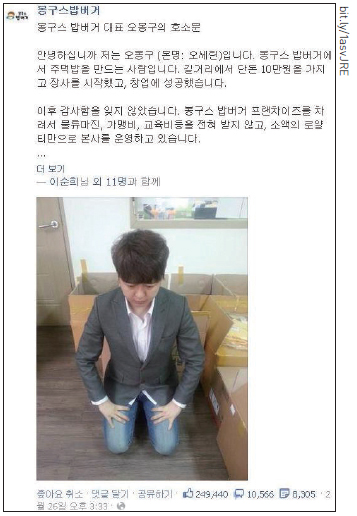
Reality of the Incompetent Patent System
As seen from the previous examples, young businessmen’s enterprises are largely dependent on ‘ideas,’ particularly on new and original recipes in restaurant businesses. Recipes are, however, difficult to be protected by patent law because the slightest change in a recipe can evade the law to nullify the validity of the patent right, and this property of the patent law makes it vulnerable to infringement. According to Patent and Business, a global intellectual property corporation, the patent system is susceptible to having three weaknesses: the protest of invalidity, the protest of no violation, and the protest of free technology. The protest of invalidity argues that the patent technology itself is invalid, and thus infringement is erroneously alleged. The protest of no violation, on the other hand, acknowledges the patent but denies its violation due to difference in composition. Among the three, the protest of free technology is the most disputable because it argues that the patent technology could be easily recreated while not imitating the original method. Difficult to be proven otherwise, the protest of free technology remains a loophole in the patent system.

For the youth’s enterprises to prosper, it seems the current Korean patent system needs new measures to protect them. To begin with, the Korean patent system should consider adopting exemplary damages in addition to compensatory damages. Compensatory damages which pay only for the harm suffered by the patentee has an impact on neither the infringer nor the society. By implementing exemplary damages and thus imposing a larger fine, it will serve as retribution and deterrence to future infringement of intellectual property. Some states in the U.S. set an example of exemplary damages by charging the infringers up to three times the damages done.
To compare the compensation charged for damages in the U.S. and in Korea, one can give an example of the lawsuit between Apple and Samsung. While the U.S. court charged Samsung 1.2 trillion won for infringement of Apple’s patent design, the Korean court sentenced 25 million won for the same infringement. Professor Shim Yeong-taek of the School of Law from Seoul National University pointed out that Korean patent valuation is one two-thousandth of U.S. patent valuation and said, “Who in their right mind would invest in research and development and apply for patents when they can use other’s patents for only ten or more million won?” Strict law enforcement like that in the U.S. could certainly bring a positive change to the current tendency of Korean people to devalue intellectual property protected by patents.
Furthermore, exclusive patent legal services should be multiplied so that professional aid can be reached easily with no delay to the ones whose intellectual property is infringed. It is a current trend that intellectual properties are valued; it was shown in the research done by Patent and Business that the number of patent lawsuits in 2010 has increased from 1,070 to 1,129 in one year. Customized service in the patent system can not only secure the innovative ideas as accepted property but also respond to possible infringements of them with immediacy. Expanded services also give advantages to patentees to win. For instance, the U.S. has a 50 percent possibility for patentees to win in lawsuits, which is twice as much as that of Korean lawsuits.
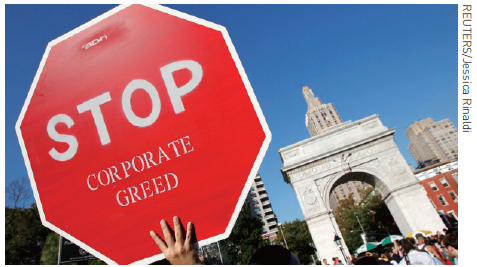
Kim You-jin Editor-in-Chief
cleo9207@uos.ac.kr
Kim Soo-yeon Junior Reporter
shunny03@uos.ac.kr

